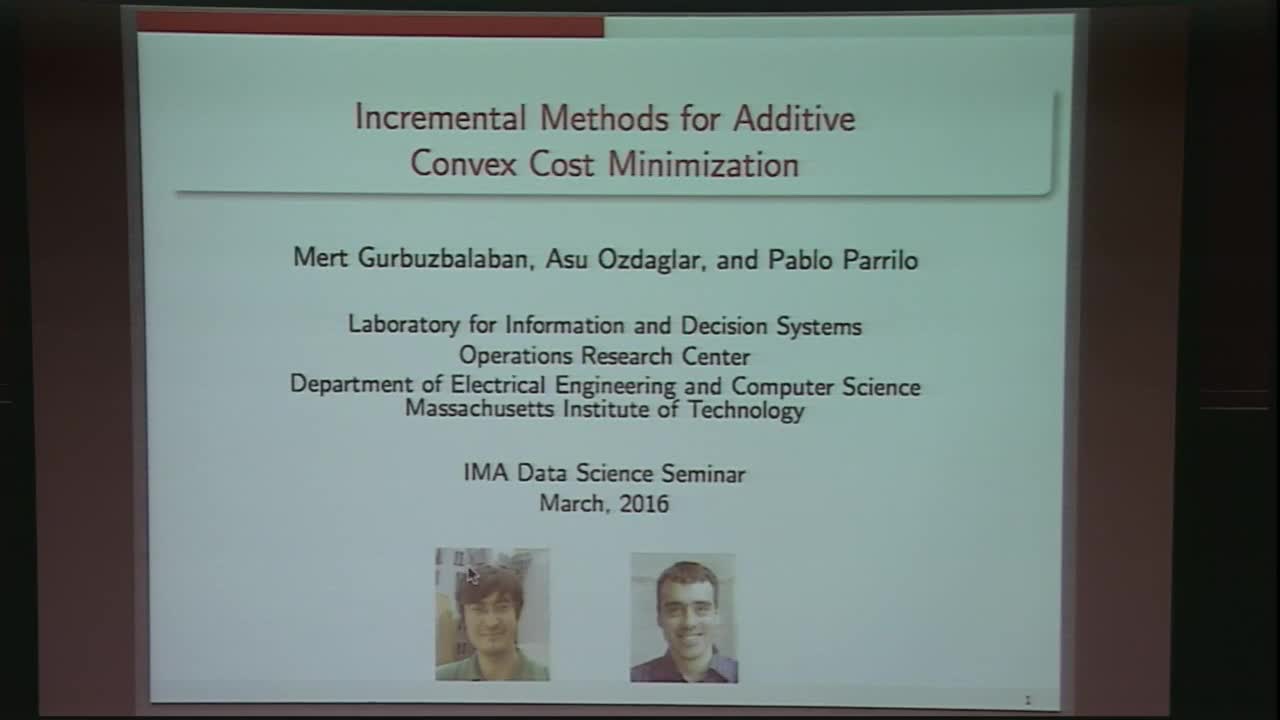Incremental Methods for Additive Convex Cost Optimization
Presenter
March 8, 2016
Keywords:
- convex cost optimization, distributed optimization
MSC:
- 68M14
Abstract
Motivated by machine learning problems over large data sets and distributed optimization over networks, we consider the problem of minimizing the sum of a large number of convex component functions. We study incremental gradient methods for solving such problems, which process component functions sequentially one at a time. We first consider deterministic cyclic incremental gradient methods (that process the component functions in a cycle) and provide new convergence rate results under some assumptions. We then consider a randomized incremental gradient method, called the random
reshuffling (RR) algorithm, which picks a uniformly random order/permutation and processes the component functions one at a time according to this order (i.e., samples functions without replacement in each cycle). We provide the first convergence rate guarantees for this method that outperform its popular with-replacement counterpart stochastic gradient descent (SGD). We finally consider incremental aggregated gradient methods, which compute a single component function gradient at each iteration while using outdated gradients of all component functions to approximate the global cost function gradient, and provide new linear rate results. This is joint work with Mert Gurbuzbalaban and Pablo Parrilo.
Asu Ozdaglar received the B.S. degree in electrical engineering from the Middle East Technical University, Ankara, Turkey, in 1996, and the S.M. and the Ph.D. degrees in electrical engineering and computer science from the Massachusetts Institute of Technology, Cambridge, in 1998 and 2003, respectively.
She is the Joseph F. and Nancy P. Keithley Professor of Electrical Engineering and Computer Science Department at the Massachusetts Institute of Technology. She is also the director of the Laboratory for Information and Decision Systems and associate director of the Institute for Data, Systems, and Society. Her research expertise includes optimization theory, with emphasis on nonlinear programming and convex analysis, game theory, with applications in communication, social, and economic networks, distributed optimization and control, and network analysis with special emphasis on contagious processes, systemic risk and dynamic control.
Professor Ozdaglar is the recipient of a Microsoft fellowship, the MIT Graduate Student Council Teaching award, the NSF Career award, the 2008 Donald P. Eckman award of the American Automatic Control Council, the Class of 1943 Career Development Chair, the inaugural Steven and Renee Innovation Fellowship, and the 2014 Spira teaching award. She served on the Board of Governors of the Control System Society in 2010 and was an associate editor for IEEE Transactions on Automatic Control. She is currently the area co-editor for a new area for the journal Operations Research, entitled "Games, Information and Networks. She is the co-author of the book entitled “Convex Analysis and Optimization” (Athena Scientific, 2003).
